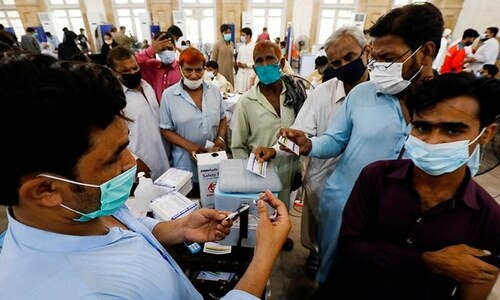The National Command and Operation Centre (NCOC) on Tuesday decided to ease coronavirus curbs in cities with a positivity rate of less than 10 per cent in light of "improved disease trends".
However, curbs will remain in place in six cities with a positivity of more than 10pc, including Karachi and Hyderabad.
In a statement, the forum said that today's meeting carried out a detailed stock of the disease situation and the non-pharmaceutical interventions (NPI) currently being enforced.
"In view of improved disease trends, NPIs are being eased out for cities with less than 10 per cent positivity," the statement said.
Indoor and outdoor gatherings have been allowed in these cities with a maximum limit of 300 and 500 fully vaccinated individuals, respectively. The same conditions have also been applied to weddings.
Indoor and outdoor dining has been allowed for fully vaccinated individuals, while takeaway has been allowed around the clock.
Gyms, cinemas, shrines and amusement parks will be open for fully vaccinated individuals. All forms of sports have also been allowed for fully jabbed citizens.
Schools will remain open for all students with stringent Covid-19 protocols, the handout said, noting that vaccination for students above 12 is mandatory.
Curbs to remain in 6 cities
However, curbs will remain in place in six cities where the positivity rate is more than 10 per cent. These cities are:
- Gilgit
- Muzaffarabad
- Mardan
- Karachi
- Hyderabad
- Peshawar
In these six cities, the ban on indoor gatherings of all kinds will continue to remain in place. Outdoor gathering gatherings will only be allowed for a maximum of 300 people who will have to be fully vaccinated.
The same conditions apply to weddings; there is a ban on indoor events but outdoor events are allowed with a maximum capacity of 300 fully vaccinated people.
Indoor dining will continue to be banned, while outdoor dining is allowed for fully vaccinated individuals. Takeaway is allowed around the clock.
Indoor gyms, cinemas, shrines and amusements parks will continue to operate at 50pc capacity for fully vaccinated individuals.
Contact sports, including karate, boxing, martial arts, rugby, water polo and wrestling, are also not allowed.
Meanwhile, students under 12 years of age will have to ensure 50pc attendance on staggered days. Students above 12 years will ensure 100pc attendance provided that they are vaccinated.
"[A] review of NPIs will be carried out on February 21," the NCOC statement said.
Across the country
The NCOC handout also included details about curbs that would remain in place across the country, regardless of the positivity rate.
According to the forum, market/business activities will continue without any restrictions on timings.
Public transport will have an occupancy limit of 70pc, but individuals will have to be fully vaccinated. "Mask-wearing will continue throughout the journey. [A] ban on serving of meals/snacks will continue," the statement said.
On the other hand, an occupancy limit of 80pc will be in place for railways. Passengers will have to be fully vaccinated and will have to wear face masks throughout the journey.
Offices will operate on normal working hours with 100pc attendance. "All employees to be fully vaccinated; however, work from home is encouraged."
In addition, there is a ban on meal/beverages being served during domestic flights and face masks will have to be worn during the duration of the journey.
Regarding wearing face masks, the NCOC said: "Compliance to compulsory mask-wearing while incorporating innovative measures for enforcement. Strict adherence to SOPs in mosques and other places of worship be ensured by all federating units."
The handout added that targeted lockdowns, with stringent enforcement protocols based on risk assessment, will continue.












































